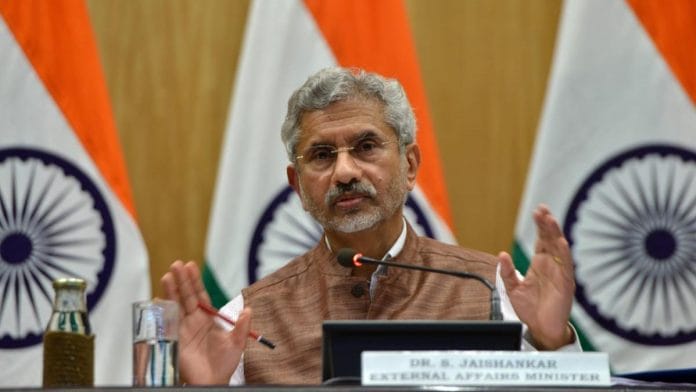New Delhi: In a veiled criticism of Pakistan, India on Thursday said repeated attempts to deliberately bring bilateral issues into the SCO violate the laid down principles of the grouping and such counter-productive acts should be “condemned”.
In a virtual address at a meeting of the SCO Council of Heads of Government, External Affairs Minister S Jaishankar also asserted that any serious connectivity initiative must be transparent and conform to the most basic principle of respect for sovereignty and territorial integrity.
The comments are seen as an indirect reference to China’s Belt and Road Initiative (BRI). India has been severely critical of the BRI as the USD 50 billion corridor passes through Pakistan-occupied Kashmir.
Jaishankar said India has been taking steps to operationalise the Chabahar port in Iran to provide secure and commercially viable access to the sea for Central Asian countries.
India has proposed to include the Chabahar port in the framework of the International North-South Transport Corridor (INSTC) while reaffirming New Delhi’s commitment to “cooperate, plan, invest and build physical and digital connectivity in the SCO region”, he said.
The eight-nation Shanghai Cooperation Organisation (SCO) has emerged as one of the largest trans-regional international organisations. India and Pakistan became its permanent members in 2017.
“India considers the SCO as an important regional group to promote cooperation in various fields based on universally recognised international norms, good governance, rule of law, openness, transparency and equality,” Jaishankar said.
“It is unfortunate to note that there have been repeated attempts to deliberately bring bilateral issues into SCO. This violates the well-established principles and norms of the SCO charter,” he said.
Pakistan attempted to raise the Kashmir issue at SCO meetings on several occasions in the last few years.
“Such acts are counterproductive to the spirit of consensus and cooperation that define this organization and should be condemned,” the external affairs minister said.
Talking about economic prosperity, he said India believes that greater connectivity is an economic force-multiplier that has acquired greater salience in the post-Covid era.
“However, any serious connectivity initiative must be consultative, transparent and participatory. It must conform to the most basic principle of international law — respect for sovereignty and territorial integrity,” Jaishankar added.
Showcasing India as an “emerging economic force” at the global level, he said the country’s agile response in fighting COVID-19 and ensuring economic stability has been noteworthy despite the economic devastation caused by the pandemic.
He said notwithstanding the pandemic, India attracted record FDI inflows of USD 77 billion in 2020-21 and another USD 22 billion in the first three months of this year.
“The International Monetary Fund has forecast a 9.5 per cent growth in the Indian economy in 2021. Our trade performance has also been strong, growing by more than 20 per cent this year.”
Jaishankar said the WIPO has ranked India number one in the Global Innovation Index 2021 in the Central and South Asian region.
“Indian Startups have so far created 65 unicorns, out of which 28 unicorns were added during 2021 alone. We stand ready to share our experience with the other SCO member states through our initiative to set up a Special Working Group on Startups and Innovation,” he added.
Also read: India, Russia and China’s foreign ministers to meet virtually tomorrow






